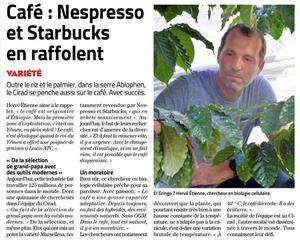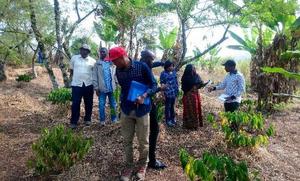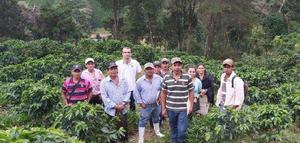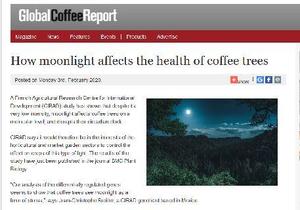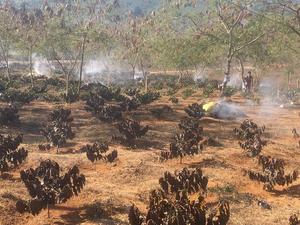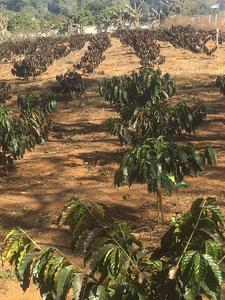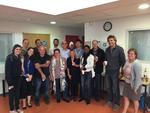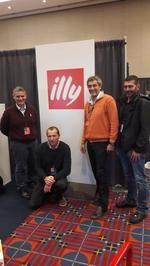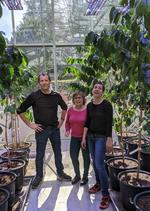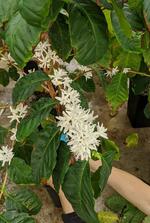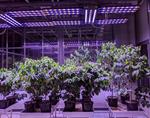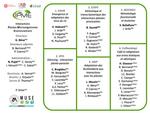Nos tutelles



CoffeeAdapt
ACTUALITES / NEWS
- The on-line journal Perfect Daily Grind published the article“Crash Testing” Coffee Hybrids’ Resistance To Adverse Growing Conditions (December 16, 2020). This article focuses on results of comparative studies carried out in growth chambers and field trials in Nicaragua, Mexico, Cameroon and Vietnam as part of the BREEDCAFS project (Breeding Coffee for Agroforestry Systems) testing resilience to drought and heatwave related to climate change on CIRAD Arabica F1 hybrids compare to traditional varieties: https://perfectdailygrind.com/2020/12/crash-testing-coffee-hybrids-resistance-to-adverse-growing-conditions/
- Benoit Bertrand and Frédérique Georget published in the on-line journal Forumcafé an article about the Arabica cv. Marsellesa : agronomic and organoleptic characteristics; optimal environmental conditions for or its cultivation, disease resistances: https://www.revistaforumcafe.com/variedad-marsellesa
- Perfect Daily Grind published online:"Creating A Sustainable Model For Coffee Replanting " Nov 4th 2020: https://perfectdailygrind.com/2020/11/creating-a-sustainable-model-for-coffee-replanting/ This article explains how the coffee agroforestry business-driven clusters organizational model created by CIRAD fosters social and environmental innovation through farm renovation allowing Nicaraguan small producers to plant high-yield, disease-resistant coffee varieties that offer greater resilience to climate change.
- The media Le Filtre interviewed Benoît Bertrand on the interest and challenges of developing new coffee varieties : https://www.lefiltre.fr/benoit-bertrand-cirad
- The head of the CoffeeAdapt team was interviewed by the newspaperMidi Libre on the search for varieties resistant to climate change:
- Sprechen Sie Deutsch? Then this article may be of interest to you: Dr. Gerhard Bytof from Tchibo published on Tchibo’s blog : Was hat Kaffee mit dem Mond zu tun? (What does coffee have to do with the moon? ) The author refers to Gallep et al . (2018): Peter Barlow’s insights and contributions to the study of tidal gravity variations and ultra-weak light emissions in plants : https://doi.org/10.1093/aob/mcx176 and the paper published by CoffeeAdapt scientists Breitler et al. (2020): Full moonlight-induced circadian clock entrainment in Coffea arabica : https://doi.org/10.1186/s12870-020-2238-4
- The Roast Magazine announced through its online Daily Coffee News that CIRAD is going to receive the Medal of Merit from the Coffee Quality Institute (CQI) for its numerous published research works on coffee specifically in the field of breeding and genetics : “CIRAD and Craig Holt Given CQI’s 2020 Leadership Medals of Merit ”. https://dailycoffeenews.com/2020/06/24/cirad-and-craig-holt-given-cqis-2020-leadership-medals-of-merit/
- If you are multilingual, you should know that the article Combating Climate Change’s Impact With Hybrid Coffee Varieties published by Perfect Daily Grind (take a look at the ad below) was re-published on several media worldwide, in China: Gafei, Russia: Coffetea or Italia: Comunicaffe. Enjoy reading / 良好的扫描 / приятное чтение / Buona scansione!
- The American media NPR, National Public Radio , published in line “Coffee Rust Threatens Latin American Crop; 150 Years Ago, It Wiped Out An Empire ” for which Benoit Bertrand has been consulted on the durability issues of resistance to coffee leaf rust caused by the fungus Hemileia vastatrix . https://www.npr.org/sections/thesalt/2018/10/16/649155664/coffee-rust-threatens-latin-american-crop-150-years-ago-it-wiped-out-an-empire?t=1594295750527&t=1594631382303
- The specialty coffee publication and media company Perfect Daily Grind wrote a paper ”Combating Climate Change’s Impact With Hybrid Coffee Varieties “ highlighting the works of CIRAD and its partners such as CATIE, PROMECAFE and ECOM that have led to the selection and dissemination of high-performance Arabica F1 hybrids . The paper reports how the activities of the BREEDCAFS (Breeding Coffee for Agroforestry Systems) Horizon 2020 project implemented in Nicaragua, Vietnam and Cameroon, contribute to develop new breeding strategies in order to create new Arabica F1 hybrid varieties that are both more resilient to climate change and more adapted to climate-smart agroforestry systems . https://perfectdailygrind.com/2020/07/combating-climate-changes-impact-with-hybrid-coffee-varieties
- The digital media company VinePair , focused on the drink world, recently published in line: “What Climate Change Means for the Future of Coffee ”. https://vinepair.com/articles/climate-change-coffee-production/ This article talks about how climate change threatens the coffee industry and about the hopes placed on F1 hybrid Arabica varieties created by CIRAD to make coffee growing more resilient to climate change: “Starmaya. Centroamericano. H1. These are names those serious about their coffee should get to know, as hybrid varieties may be the coffees of the future. ” “Much of the coffee industry’s hope lies at the feet of F1 hybrids. These varieties are stronger in the face of weather extremes and diseases. To save the industry, they must prove climate-change-proof and economically viable for the farmer while tasting delicious to consumers .”
- In the same way, the Technology Review of the prestigious MIT (Massachusetts Institute of Technology) published in line: “The accident that led to the discovery of climate-change-proof coffee ” https://www.technologyreview.com/2019/04/24/135937/the-accident-that-led-to-the-discovery-of-climate-change-proof-coffee/ This article based on the interview of a researcher of one of our Central American partners, CATIE, Costa Rica, tells the story of the initial F1 hybrid creation and in vitro propagation development, especially for the now successfully disseminated variety Centroamericano.
- The Breedcafs project (European H2020 funding) leaded by CoffeeAdapt team is very successful in Vietnam with very promising results in the field both in terms of new F1 hybrid Arabica varieties propagation in nurseries and in terms of demo-plots planted in 2017. The first important flowering in March 2020 is monitored as part of the process of phenotyping for assessing the adaptation of these new varieties to local conditions and their acceptance by small coffee growers.
- Breedcafs activities: Coffee nursery with F1 hybrid Starmaya propagated by rooted micro-cuttings and a demo-plot with the first flowering of new F1 hybrid Arabica varieties recently introduced in the country (March 2020)
- November 2019: Cirad experts visiting ‘on farm’ demo-plots in Son La and Dien Bien provinces, planted with some F1 Arabica hybrids with local Catimor used as control, as part of Breedcafs project (European H2020 funding) in Vietnam
- Médiaterre (Le système d’information mondial francophone pour le développement durable) relayed on Twitter the information about testing new Arabica F1 hybrids in Cameroun through small coffee grower clusters as part of Breedcafs project (European H2020 funding). This extension activity is implemented by CIRAD in collaboration with IRAD from Cameroun (Institut de Recherche Agricole pour le Développement) as part of the national strategy of revival of coffee research and production: https://www.mediaterre.org/actu,20200323103358,6.html?utm_source=dlvr.it&utm_medium=twitter
- An international genomic study on Arabica coordinated by CoffeeAdapt team (Cirad, France), the World Coffee Research (USA) and the Institute of Applied Genomics (Italy) demonstrated that an extremely recent single allopolyploidization event was at the origin of the tetraploid genome of Coffea arabica . This discovery explains the very low genetic diversity of wild and cultivated Arabica germplasms. The implications of this discovery for the breeding strategies as well as for the vulnerability of Arabica coffee to climate change and biotic stresses are discussed in: https://www.cirad.fr/en/news/all-news-items/press-releases/2020/arabica-coffee-super-individual-limited-genetic-diversity ; https://www.nature.com/articles/s41598-020-61216-7
- The French public radio channel, France Inter (part of Radio France), interviewed the CoffeeeAdapt team coordinator, Hervé Etienne, about « How to help tropical plants adapt to global warming? ” You can listen this interview on line: https://www.franceinter.fr/personnes/celia-quilleret or read the associated article: https://www.franceinter.fr/environnement/comment-aider-les-plantes-tropicales-a-s-adapter-au-rechauffement-climatique
- As part of Breedcafs project funded by the EU (H2020), in partnership with IRAD of Cameroon , CIRAD is coordinating the evaluation of the new Arabica hybrid F1 varieties that are of interest to the local coffee sector because of their high productivity, resistance to environmental stresses and high cup quality supply. Hybrid F1 mass propagation techniques transfer to IRAD and wide-scale dissemination of these varieties to growers through agroforestry coffee clusters implementation are programmed for the next 5 years: https://afrique-centrale.cirad.fr/actualites/varietes-cafeiers-arabica
-
A women entrepreneurial initiative for propagation of Arabica F1 hybrid plants and forest trees was created in Nicaragua as part of BREEDCAFS project funded by EU (Horizon 2020) for renovation of coffee agroforestry systems of small growers in the area . CIRAD coordinated this women’s entrepreneurial initiative in close collaboration with its local partners: NicaFrance Foundation (NFO), the Dutch not-for-profit international development organisation SNV and ECOM group. This success story carried-out in Nicaragua paves the way to similar initiatives in Cameroon and Vietnam as part of the BREEDCAFS project. See the video and twitter news with the links below:
https://twitter.com/SNVCAMERICA/status/1230172312915369985
The first-ever farmer field day for on-farm trials belonging to the Global Coffee Monitoring Platform from World Coffee Research aimed at improving farmer profitability as a basis for economic sustainability took place in November 2019 in Nicaragua. The visited trial focus on nutrition and soil conservation (through cover crops) practices applied on coffee varieties developed by CIRAD and local partners (ECOM, PROMECAFE): Marsellesa, Starmaya, and Centroamericano (H1) : https://worldcoffeeresearch.org/work/-farm-demonstration-trial-network/taking-it-field/
- When agroforestry coffee systems contribute to reforestation:
The BBC mentions the example of H2020 Breedcafs project in Nicaragua funded by the EU and leaded by CoffeeAdapt team: https://www.bbc.com/future/article/20190304-how-do-you-bring-a-forest-back-to-life
The coffee circadian clock disrupted by the moonlight:
Coffeeadapt team just published in BMC Plant Biology journal a work demonstrating for the first time that moonlight, albeit weak, can affect the circadian clock genes expression of coffee trees. Beyond the interest for coffee functional genomic, the results of this study could also have interesting applications for greenhouse crops using artificial light.
https://sfrpresse.sfr.fr/article/8f05c08e-9955-417f-beab-0fa2acf8067f
Midi Libre February 1st 2020
A PhD student’s work, as part of Breedcafs project, was awarded by the Danish Development Research Network:
The second prize in the Danish Development Research Network Essay Competition for University Students 2019 was awarded to Athina Koutouleas, Geosciences and Natural Resource Management, University of Copenhagen, for its essay about the work of BREEDCAFS: https://ddrn.dk/does-climate-change-put-our-morning-cup-of-coffee-at-risk/
- Additionally, Athina Koutouleas (PhD student of the University of Copenhagen) recently published the paper “On the hunt for the alternate host of Hemileia vastatri x”: https://doi.org/10.1002/ece3.5755
"CIRAD Says Potentially Revolutionary F1 Arabica Hybrid Starmaya is Now in Seed Form" in Roast Magazine
After a recent and successful first massive production of Starmaya seeds in concert with Ecom Agroindustrial Corp. in Nicaragua (the propagation of this F1 hybrid variety by seed has been made possible by using a naturally male-sterile wild Ethiopian accession), the coffee sector is taking a special interest in this new F1 hybrid variety:
https://www.cirad.fr/en/news/all-news-items/press-releases/2019/starmaya-coffee-seeds-arabica
Agroforestry: a protection against winter frosts
Agroforestry coffee growing systems provide important and numerous ecosystem services like biodiversity conservation, carbon sequestration or important role for water cycle in catchment areas. It also provides more crop resilience to climate change, and we immediately think in mitigation of abiotic stresses like heatwaves or pronounced droughts but agroforestry can also protect coffee plantations from frost! That’s what happened at the beginning of this month of December in Northern Vietnam as shown in these pictures taken on an Arabica monitored experimental plot as part of the Breedcafs project ( http://www.breedcafs.eu/). In these pictures (Author: Philippe Vaast, CIRAD, UMR Eco&Sols) we can see that all the coffee trees grown in full sunlight have 100% of their leaves burned by the frost (leaves turned brown on the pictures) despite the attempts to reduce freezing impacts by burning rice husks while minor damage was observed on coffee trees grown Under Leucaena shade. With agroforestry, keep your coffee trees warm in winter and cool in summer!
Freezed coffee trees with burned leaves at the forefront in full sunlight versus
still green coffee trees under Leucaena
shade in the background
A reverse picture with still green coffee trees under Leucaena shade at the forefront and freezed coffee trees with burned leaves in full sunlight in the background
- Within the framework of Breedcafs Project founded by the EU, the gender smart cooperative project “Grupo Rural de Mujeres Viveristsas ” is a real women’s success story. This women’s nursery cooperative have been producing and selling more than 100 thousands of timber tree plantlets with a value of some US$ 15 thousands for the local coffee agroforestry cluster project. Species like Macacauba,Platymiscium spp. (Coyote), Nicaraguan Rosewood, Dalbergia retusa (Granadillo), Honduran Mahogany, Swietenia macrophylla (Caoba del Atlántico) and Australian silver oak, Grevillea robusta are propagated in nursery tunnels from seeds of elite mother trees. After this first stage, it is planned financial autonomy will be reached in 2020.
- Video
- Presentation of our private Partner SMS, Sustainable Management Services, a branch of ECOM Agroindustrial Corp. Ltd and its mass-production (in vitro and horticultural) platform, Agritech, of Arabica elite varieties especially F1 hybrids , located in Nicaragua : Vidéo
- Les médias en parlent...
- The program Doc du Dimanche « Café, le nouvel or noir ? » broadcasted by France.tv Channel 5 on September 29 2019 remains available on line until October 6th with an interview of Benoît Bertrand about creating new Arabica varieties resilient to abiotic and biotic stresses induced by climate change: https://www.france.tv/france-5/le-doc-du-dimanche/1070497-cafe-le-nouvel-or-noir.html
- Midi Libre published an interview of Hervé Etienne on September 24 2019 about the strategy of CoffeeAdapt for creating coffee varieties adapted to agroforestry and resilient to abiotic stresses due to climate change : https://www.midilibre.fr/2019/09/24/montpellier-herve-etienne-veut-creer-un-cafe-resistant-au-changement-climatique,8434051.php
- A team of Radio-Canada filmed the activities of two CoffeAdapt scientists: Jean-Christophe Breitler and Luc Villain, in the field and in the labs of the local Partner, Instituto de Ecologia , at Xalapa, Veracruz in Mexico . The documentary address risk to Arabica crop in Mexico because of climatic disturbances already observed for a number of years in this region and the CoffeeAdapt research activities for creating Arabica F1 hybrid varieties resilient to abiotic and biotic stresses due to climate change : Radio Canada Mexique
- Reportage France 3 - Agroforesterie
- BREEDCAFS Press Release
- H2020 (BBC )
- Hybride résistant à la rouille au Nicaragua (Daily Coffee News )
- Starmaya l'hybride prometteur (Daily Coffee News )
- The race to develop coffee that can survive climate change
- Mexique, Café, Réchauffement Climatique (FRANCE 2 )
- The race to save coffee (Washington Post )
- http://www.scanews.coffee/2017/10/29/is-arabica-washed-out-25-magazine-issue-2
- France Inter
THEMATIQUES DE RECHERCHE
Notre équipe s’intéresse à la réponse adaptative des caféiers face aux stress abiotiques et biotiques. Nos activités de recherche sont développées selon trois axes principaux:
Mécanismes génétiques, épigénétiques et métabolomiques de la réponse adaptative
- Evaluation de l'impact des stress thermique et lumineux sur 1) le métabolisme général de la plante et de son fonctionnement via l’analyse des modifications au niveau du transcriptome et de l’épigénome (miRNA, méthylation de l’ADN), 2) l'horloge circadienne les activités photosynthétiques et (photosynthétats et métabolites secondaires), 3) la croissance, la production, la qualité des grains et 4) la résistance aux maladies et ravageurs.
- Analyse fonctionnelle des gènes jouant un rôle clé dans les mécanismes d'adaptation via la transformation génétique par Agrobacterium et genome editing (Crispr-Cas9)
Dynamique des génomes
- Structure du génome par des approches de génomiques évolutives
- Mécanismes du contrôle de la mobilisation des éléments transposables et leur conséquence sur la structure du génome
- Analyse de la diversité allélique pour la tolérance au stress thermique présente chez les espèces sauvages
Modélisation, outils de pre-breeding et assistance aux programmes de breeding
- Modélisation : les données phénotypiques, métaboliques et moléculaires sont combinées aux réactions métaboliques et aux évaluations de la qualité des grains et du café à la tasse (MapMan pathways) via le développement d'une plateforme de bioinformatique interactive permettant de comprendre les interactions génotype-environnement (GxE), d'identifier les meilleurs prédicteurs et les parents adéquats pour assister les programmes d'amélioration pour la création de nouveaux hybrides d'Arabica.
- Pre-breeding et assistance au breeding. L'équipe CoffeeAdapt développe des outils analytiques et prédictifs pour établir des réseaux métaboliques chez le caféier. L'objectif est de permettre une sélection précoce assistée par marqueurs et de développer une nouvelle approche pour l'amélioration des espèces de plantes pérennes.L'équipe est étroitement impliquée dans d'importants programmes d'amélioration du café Arabica en partenariat et dans le développement de procédés de micropropagation innovants par embryogenèse somatique, mini boutures enracinées et mini greffage pour garantir la diffusion à grande échelle des hybrides F1 améliorés.
Caféier et Changement Climatique
Modèle biologique: les espèces cultivées
Le café arabica (Coffea arabica L.) et le café Robusta (C. canephora Pierre) sont les deux principales espèces utilisées dans la production de café, fournissant respectivement environ 70% et 30% de la production commerciale. Cultivé actuellement dans plus de 50 pays de la zone tropicale humide, le café est le deuxième produit commercial mondial le plus important après le pétrole brut. En 2013/14, ses exportations ont été estimées à 107,6 millions de sacs, soit un échange commercial de 17 milliards de dollars. Sur les 40 pays producteurs de café que compte l’Organisation Internationale du Café (OIC), la moitié a de faibles revenus et une vulnérabilité économique élevée. Bien que l’image de la caféiculture soit associée à celle d’immenses domaines tels que l’on peut en rencontrer au Brésil, 70% de la production mondiale provient d’exploitations familiales d’une superficie le plus souvent inférieure à 5 hectares. D’après, l’OIC, Il existe dans le monde, 20 à 25 millions d’exploitations caféicoles faisant vivre directement 125 millions de personnes.
Changement climatique et production
Le changement climatique (CC) menace la culture d’un grand nombre d'arbres tropicaux, le café y compris. Malheureusement, les réponses à apporter sont peu connues car très peu d’études y ont été consacrées. Les conséquences prévues du CC comprennent des changements dans les précipitations, des périodes de sécheresse plus fréquentes et des températures élevées. Pour le café arabica dont la production est très sensible aux variations climatiques, cela va entrainer un déplacement géographique des zones productrices. A très court terme, le changement climatique constitue donc pour la caféiculture, une menace environnementale, économique et sociale. En effet, de nombreux pays producteurs de café sont également parmi les plus vulnérables au risque climatique comme le Honduras, le Nicaragua, le Vietnam et le Guatemala. Depuis les années 1990 ces derniers sont classés parmi les 10 pays les plus sévèrement touchés par le changement climatique.
Modèle de culture: Agroforesterie (SAF)
L’adoption et l'amélioration des pratiques agricoles les mieux adaptées au CC, ainsi que la création de variétés de café spécifiques sont importantes pour prévenir les problèmes environnementaux, économiques et sociaux qui se poseront avec le réchauffement global. Les systèmes agroforestiers (AFS), qui consistent à cultiver une culture en association avec des arbres dans la même parcelle, apparaissent comme l’option la plus appropriée. Parmi les nombreux avantages, les arbres d'ombrage dans les systèmes de culture tamponnent les variations extrêmes et diurnes de la température et de l'humidité, en atténuant les effets d'un climat plus chaud et plus sec. Pour le café arabica, plante ombrophile, le rôle positif des arbres d'ombrage a déjà été démontré.Les AFS sont répandus dans beaucoup de pays tropicaux et représentent 60% des 8 millions d'hectares de plantations d'Arabica. Lorsqu’ils sont correctement gérés, les AFS en exploitant les synergies biologiques et économiques, conduisent à une gestion durable des terres et à la création de revenus locaux plus élevés et plus stables pour principalement les petits producteurs (réduction d’intrants, produits de remplacement= arbres d’ombrage…). Malheureusement, la productivité et la rentabilité du café AFS peuvent être inférieures de 30% par rapport aux systèmes culturaux de plein soleil. L'une des principales raisons de la faible productivité de l'AFS est la prédominance des variétés de café modernes qui ont été développées pour les systèmes intensifs et à plein soleil et qui sont donc moins bien adaptées à l'AFS.
Objectifs
Résilience des systèmes de productions
Nouvelles solutions pour l'amélioration génétique des espèces pérennes
Exploitation de la vigueur hybride
Développement d'outils de sélection performants
L’email a bien été copié
L’email a bien été copié
L’email a bien été copié
L’email a bien été copié
L’email a bien été copié
L’email a bien été copié
L’email a bien été copié
L’email a bien été copié
L’email a bien été copié
L’email a bien été copié
L’email a bien été copié
L’email a bien été copié
L’email a bien été copié
L’email a bien été copié
L’email a bien été copié
L’email a bien été copié
L’email a bien été copié
L’email a bien été copié
L’email a bien été copié




